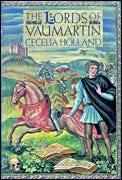The 1346 Battle of Crécy launches The Lords of Vaumartin, the story of a Breton nobleman robbed of his inheritance. At fourteen, Everard de Vaumartin is, says his uncle's wife, "a feeble enough creature, always dreaming like a girl, or bent over a book." She urges him to become a monk, which would cause his deceased father's estate to pass to his uncle Josseran, who has been holding it during Everard's minority. Everard refuses, despite his love of learning. When she suggests he go to war instead, he agrees. To Josseran, she says, "If ... something befell him, who would blame you?"
The scenes of warfare in The Lords of Vaumartin are exceptionally vivid and frightening, conveying the confusion of warfare to a young man plunged into battle for the first time—without confusing the reader. We learn viscerally why the French lost faith in their king, the hesitant, vacillating John II, early in the Hundred Years' War. "It would be disastrous to charge down this road in a rainstorm.... The rain was falling harder now, loud on the helmets and shields of the knights. Josseran pressed his horse closer to the king, wanting to counsel agreement with the Genoese captain.... The king sat in his saddle, frowning, the rain running down his face, while the Genoese captain shouted from the ground, but the words might as well never have been spoken...."
Unlike so many who fight at Crécy, Everard is not killed. In Paris he reinvents himself as a scholar and clerk, but the war dominates all, bringing political turmoil, financial disorder, famine and plague. In the midst of disaster, he crafts a strangely satisfying life. Though Everard is fictional, historical figures play key roles. An especially memorable portrait is of Dauphin Charles, the grandfather of the more famous dauphin whose champion would be Joan of Arc. (1988; 344 pages)




